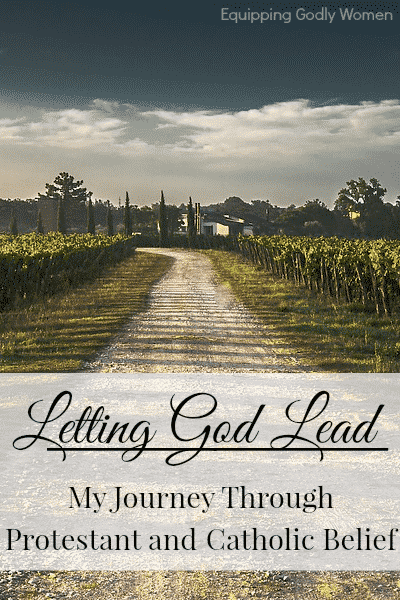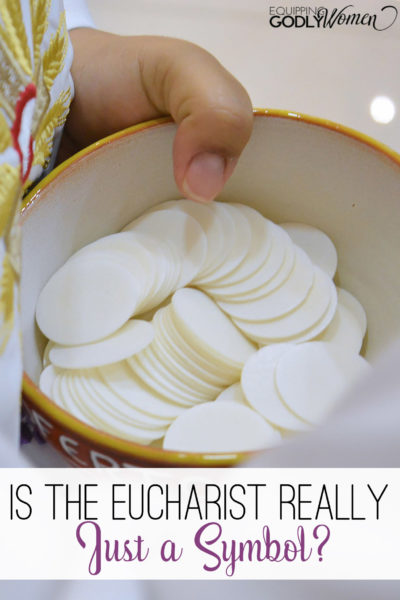Is the Eucharist Really Just a Symbol? 5 Convincing Proofs that Say that It’s Not
This post is post 3 in a series entitled Letting God Lead: My Journey Through Protestant and Catholic Beliefs. While you certainly can read this post by itself, I highly encourage you to check out the rest of the series as well. Find more about this series and a list of all of posts here. This post contains affiliate links.
The first blow to my old Protestant belief system was a big one, and one I wasn’t expecting. As I was reading along in the book Surprised by Truth, one section jumped right off the page and stopped me right in my tracks:
“Writing to the church at Smyrna, a major Christian center in Asia Minor, Ignatius condemned heretics who denied that Christ had an actual physical body… To refute them, Ignatius wrote “They [the heretics] even absent themselves from the Eucharist and public prayers [cf. Acts 2:42], because they will not admit that the Eucharist is the flesh of our Savior Jesus Christ which suffered for our sins and which the Father in his goodness afterwards raised up again.”
Now, I’d had Catholics tell me that Jesus’s words “This is my body” and “This is my blood” were literal before, but not one of them could ever give me a single solid reason why I should believe it other than because that’s what they *thought* the words meant. Well… that’s not a very good argument. They thought it meant one thing–I thought it meant another. So… not exactly convincing.
You see, Jesus spoke in parables all the time, I reasoned. Therefore, the most logical conclusion was that this was simply another metaphor too. Just like how he said he was the vine and the door. Metaphors.
Except that once I started researching further, I started to discover things I never knew before. And in the course of my research, I found five very convincing reasons why the Eucharist must be none other than the real body and blood. Maybe they’ll convince you too?
[thrive_leads id=’23166′]
1. The Early Church Believed It
I’ve always thought that if anyone had a chance of getting it right, it was the early church. After all, they were the ones who heard it straight from the source.
Take Ignatius, for example (author of the quote above). Ignatius was the first bishop of Antioch (the city were Jesus’ followers were first called Christians) and he studied under the apostle John (the one that wrote the Gospel of John). I’d say he would probably be a pretty reliable source! And yet, here he was writing about the real presence of the Eucharist as though it were common knowledge only 10 to 15 years after the apostle John’s death! That’s not a lot of time to get the message mixed up.
You don’t just have to take his word for it though. Apparently all of the early church fathers believed in the real presence of the Lord in the Eucharist. In fact, the doctrine was never seriously questioned until the 11th century. Hmmm…. Did not know that.
Given the choice between what my pastor says today and the beliefs of the first (and second, and third…) century church… well that’s a pretty strong argument. And it’s not the only one.
2. The Jews Couldn’t Accept It
Another thing I never realized: The “this is my body… this is my blood” passage you read in Luke… it isn’t the only time when Jesus talks about being the bread of life.
I won’t retype the entire passage here, but I strongly encourage you to look up and read John 6:22-71 (link for your convenience). In it, Jesus has a lengthy discussion with the Jews in which he compares the manna the Israelites ate in the desert and the bread of eternal life that God offers today. The Jews are understandably very confused, but Jesus just keeps repeating the same thing over and over again.
“Jesus said to them, “I am the bread of life; whoever comes to me will never hunger, and whoever believes in me will never thirst.” –John 6:33
“I am the bread of life. Your ancestors ate the manna in the desert, but they died; this is the bread that comes down from heaven so that one may eat it and not die. I am the living bread that came down from heaven; whoever eats this bread will live forever; and the bread that I will give is my flesh for the life of the world.” –John 6:48-51
“Jesus said to them, ‘Amen, amen, I say to you, unless you eat the flesh of the Son of Man and drink his blood, you do not have life within you. Whoever eats my flesh and drinks my blood has eternal life, and I will raise him on the last day. For my flesh is true food, and my blood is true drink. Whoever eats my flesh and drinks my blood remains in me and I in him.'” –John 6:53-56.
But where it REALLY gets interesting is the Jews’ reaction after the fact. In verse 66, it records that “many [of] his disciples returned to their former way of life and no longer accompanied him.” Would they leave over a mere symbol? Seems doubtful. So I’m guessing that the Jewish people knew Jesus was being literal, even if they didn’t really understand it.
3. Jesus’s Use of the Greek Word “Trogon”
While having the ability to read the Bible in English is wonderful; it does come with some limitations. One of which is the fact that some things are lost in translation.
What you DON’T notice when reading the passage above is that when Jesus talks about eating, he is actually using two separate verbs. At first, he uses the Greek word “phagon” which is the normal Greek word for “to eat.” Part way through the passage, however, he suddenly switches to the word “trogon,” which literally means to crunch or gnaw.
Jesus wasn’t telling them to “partake” or “consume.” He was saying they literally had to crunch, gnaw or chew. (Kind of hard to “crunch” on a symbol… but you can try!) Furthermore, the tense of the word “trogon” implies that this is an action that will take place continuously over time–not as a one-time event.
4. The Eucharist Comes with a Strong Warning
Fast forward to 1 Corinthians, and you’ll find this strongly worded passage:
“Therefore, whoever eats the bread or drinks the cup of the Lord unworthily will have to answer for the body and blood of the Lord… For anyone who eats and drinks without discerning the body, eats and drinks judgement on himself. That is why many among you are ill and infirm, and a considerable number are dying.” –1 Corinthians 11:27, 29-30
Since when do mere symbols come with death penalties?
5. Eucharistic Miracles
Before a few weeks ago, I never even knew there was such a thing as Eucharistic miracles. At first I was very skeptical–because how could you even prove something like this? But from what I can tell at least SOME of the miracles are VERY well documented, scientific and hard to dispute.
This video on the Eucharistic Miracle of Lanciano was my favorite by far. It’s not gross (Some of them are gross! Is it bad to say that?), but it is based on science and facts, and it’s really interesting!!
https://www.youtube.com/watch?v=WeIz4UGI_Zc
Well, there you have it, folks. These aren’t the only reasons–I actually came up with a few more–but if you believe in the Bible and these arguments don’t convince you (or at least cause you to question!), then I don’t know what will!
And now to answer a few of the burning questions you’ve been asking…
What do Catholics Believe About the Holy Eucharist?
In brief:
- The Holy Eucharist is the real body and blood of Jesus Christ in substance, even though still unleavened bread and wine in appearance. This is called “transubstantiation.”
- The elements become the body and blood at the moment when the priest says the words “This is my body” *poof!* and “This is my blood” *poof!*
- They stay the real body and blood as long as they keep their same form. (Once you digest them, they aren’t anymore.)
- Taking the Eucharist offers forgiveness for minor (venial) sins, but not major (mortal) sins. If you are in a state of mortal sin, you should not take the Eucharist until after you go to confession. (Venial/Mortal sins and confession are all topics for another day)
- Jesus is wholly present in equal amounts whether you have one speck of either the unleavened bread OR the wine or if you have a huge helping of both. Same amount of Jesus. (See the video above. That was awesome.)
Why Can’t Protestants Take Part in the Eucharist in a Catholic Church?
At Protestant churches, all Christians are welcome to receive the communion, yet at Catholic churches, only Catholics can. Why is that?
Well, contrary to popular belief, Catholics aren’t discriminating against non-Catholics. Instead, the main reason is that Catholics recognize the Eucharist as the true body and blood, and so they don’t just hand it out to people who don’t believe in it or who might treat it without the reverence and respect that it deserves.
Most Protestants do not believe that the Eucharist is the true body and blood–but only a symbol–and so for a Protestant to take the Eucharist without believing in it would be considered eating without discerning–a very serious offense according to 1 Corinthians 11:29.
Secondly, according to 1 Corinthians 11:16-17, everyone who participates does so in fellowship as part of a whole, unified community. (Catholics do not believe mass happens at individual churches, but that there is ONE mass in Heaven and by receiving on Earth, they are participating in the Heavenly mass with God and the angels.) While Catholics would love to welcome Protestants to the table, it would imply a unity that isn’t really there. (Not my rule. Don’t look at me.)
And finally–not all Catholics can participate in the Eucharist either. In order to partake, Catholics and non-Catholics have to be in a state of grace, have to have gone to confessions since their last mortal sin, and some other stuff. Protestants (and many Catholics) don’t meet these guidelines.
So… for those of you who were asking–these are the official reasons. And you should probably go check out these two articles which can explain it much better than I can:
Who Can Receive Communion on Catholic.com
Why Can’t Non-Catholics Take Communion on CatholicBridge.com
So I hope that helps?
Conclusion
I know that the Eucharist is strange and doesn’t make a lot of sense. But honestly, much of Christianity doesn’t make sense when you look at it from a purely logical perspective. (Three persons in one? There has to be blood shed for our sins?) That’s why it takes faith.
But–thankfully for people who need logic too (like me)–it isn’t JUST faith. There are very convincing reasons to believe in it too. And these are my five.
Discussion time! Do you believe the Eucharist is the real body and blood? Why or why not? What questions or concerns do you have?

Enjoyed this post? Don’t miss the rest of the posts in the series!
The Day I Realized My Religion Got it Wrong
10 Common Catholic Church Myths that Critics Believe
Is the Eucharist Really Just a Symbol?
Who has the Ultimate Authority? A Biblical Look at Sola Scriptura
A Brief Look at the History of Christianity
What All Christians Should Know About Priests, the Pope and Confession
What Do Catholics Really Believe About Mary, Saints and Statues?
Infant Baptism or Believer’s Baptism? Which is Correct?
What is Purgatory? What are Indulgences?
Why Do Catholics….? Honest Answers to Your Burning Questions
Protestant and Catholic Beliefs Series Conclusion
Resources
I’m not asking you to believe because I say so. Please DON’T take my word for it! The purpose of this series is only to share what I’ve learned on my journey in order to inspire you to begin a journey of your own. Here are a few helpful resources to get you started.
*This post contains affiliate links, which means if you make a purchase, I may make a small commission at no additional cost to you. Thank you!
Catechism of the Catholic Church
Surprised by Truth: 11 Converts Give Biblical and Historical Reasons for Becoming Catholic by Patrick Madrid
A Concise History of the Catholic Church by Thomas Bokenkotter
What Catholics Believe about John 6 by Tim Staples
Two Minute Answers to Your Questions About the Catholic Faith by CatholicsComeHome.org
Who Can Receive Communion by Robert H. Brom
Why can’t non-Catholics, Evangelicals and Protestant denominations receive Catholic Communion? by CatholicBridge.com








How very true! Sometimes I wonder what people thought Christians did for centuries, what practices they carried on that were instituted by Christ himself through the apostles, before anyone came around offering their own “truth”. The church never created new beliefs or practices, only confirmed publicly what has been truth since the time of Jesus!
I think many Protestants don’t think about it! I never did. Or they just assume the Catholics got off by a couple degrees somewhere and ended up way off 2,000 years later. I think the biggest issue is many (most?) Protestants AND Catholics don’t truly know what the official church teaches or why.
If you haven’t already, you might check to see if your library has a copy of William A Jurgens’ Faith of the Early Fathers. It’s a three volume set (each volume covers a different time period) of quotes from the Early Church Fathers and the index in the back allows you to search by topic and get a lot of relevant quotes.
Sounds interesting! Thanks for sharing!
Interesting read, Brittany. Catholics are one of the few Christian denominations that believe that the bread and wine are the true body and blood of Christ. Even after reading this, it is still hard for me to believe that the Catholics got it right and “mostly everyone else” got it wrong. And I know you provided reasons for this in your post, but I cannot get over that other Christians cannot participate in communion at a Catholic church. It doesn’t seem right to me at all. Like I said in my own post…we are all worshipping the same Jesus.
Well, whether it is or is not isn’t really up to a vote… 🙂 And yes we are.
Since the long reply/explanation to Laura was not to you Brittany, you may miss it (not show on your notifications). You may find some items in it helpful, if you have not dealt with them yet, or come across them as of now.
Blessings.
I see and read every single comment. 🙂 I have two posts planned on these exact topics over the next two weeks.
With all due respect, Laura, using the yard stick of what is most believed, or popular, to determine what is truth seems like a terrible idea! Truth would change! (As you can see, Christians as a whole believed in the Real Presence since the beginning of the Church.) Also, your thinking is misguided. You consider Catholic and “the few other Christian denomindations that believe. . . ” to be the minority. if you consider that people that make up these denominations (Catholic, Eastern Orthodox, Orthodox, some Lutheran and some Episcopalian) you would come close to 1.8 billion people, about 1 billion more than those who are of a protestant denomination that do not believe. I don’t mean to be pushy at all, but I do think this teaching is of such importance that we don’t dismiss it because it doesn’t seem like everyone could be so wrong. http://en.wikipedia.org/wiki/List_of_Christian_denominations_by_number_of_members
Laura, it is not that one got it right and all those that have been born into the Protestant Reformation, or have come to learn about Jesus and believe in Him through the love of someone within the Evangelical Christians got it wrong. At the core of all this we are confronted with two realities.
The first is that the Catholic Church and all the Orthodox Churches have the EXACT same beliefs in the seven Sacraments, and BOTH claimed to go all the way back to Pentecost day. These beliefs go all the way back to the apostles, and of the seven Sacraments, one of them is the Eucharist. It is important to understand that this belief was handed down to them and continues to this day.
The second is that the completely ‘new’ doctrine that was born from the Protestant Reformation (PR) is that the Bible is the ONLY authority on Christians (Sola Scriptura), of course there was also the Sola Fide (Faith Alone) doctrine, but this one is not relevant here. This ‘Bible Alone’ core belief creates the dilemma of having to depend solely on the Bible to retrieve and understand its information as if it was a very thorough ‘manual’. The reality is that there are some things which are pretty clear and straight forward, while others are not at all and can be interpreted in a variety of ways.
The reality of the myriad of interpretations can be found when we talk of many Protestant doctrines. Take baptism as an example. Some denominations within the PR believe in infant baptism, while others reject infant baptism and adhere solely to adult baptism. Furthermore, even within them there are some that believe and profess that baptism is merely a symbol, while others say it is more than a symbol. Here, again, both Catholics, Orthodox, Coptics, etc (all ancient Churches) have the same faith.
So, as I have shown, this divergence of beliefs is not only on the Eucharist, but is the fruit of deciding that the Bible is the ‘complete’ revelation of God to mankind, which the Bible itself contradicts, and then trying to figure out what it says and means. The fact is that when it comes to us having ONE Faith, what we witness today is a long ways from it. Even within Martin Luther’s time they could not agree on the Eucharist, Baptism, and various other things. This is the reason why they went in different directions and with different beliefs, while excommunicating each other at times.
I hope this helps, and brings some peace into your heart.
Luther held a belief similar to the Catholic (but not the same), which is what the high Lutherans and Anglicans believe, John Calvin rejected his interpretation and it was much more symbolic, and this accounts to the Presbyterians and many reformed churches. And Huldrych Zwingli rejected them both and adhered to it being nothing more than a symbol, and his belief is the preponderant one in today’s Evangelical Christians.
So, ask yourself. Which of these three got it right? All three are very different. They were using the same Bible and rejecting the Catholic Church’s teaching. The sad thing is that none got it right (no offense meant).
The moment that Luther proclaimed, based on his OWN authority, that the Bible was the ONLY authority for all Christians he had no idea of what was going to take place. Later in his life he realized that he had opened the flood gates and instead of one pope he had thousands. The irony here is that the New Testament was written long after the Church was alive and well, and before the Bible took its present form, there were tremendous persecutions where all sacred writings were just as fiercely sought for destruction as were the Christians.
Contradicting Luther’s ‘new’ doctrine of Sola Scriptura, St Paul tells us the THE Church is the ‘Bulwark & Pillar of Truth’, and NOT the Bible. Actually, the Bible did not even come into its present form for another 350 years. Additionally he tells us to hold on to the TRADITIONS he was teaching them either orally or by writing. What was being taught orally makes the written Word be perfectly understood, but without this oral tradition, we have to be continuously trying to re-invent the beliefs of the early Church. I think the success of the results speak for themselves, since there are hundreds, possibly thousands, of variances in beliefs and some are diametrically opposed.
Regarding the Baptism, I did not complete something.
It is important to realize that Catholics, Orthodox, Coptics, Armenians, etc (all ancient Churches) have the same faith. Baptism is NOT a mere symbol, unlike most Protestants. In the Catholic Church we use the term Sacrament (from the Latin = mystery), while in the other traditions they may use slightly different language to say the same thing.
Additionally, the closing statement: “I hope this helps, and brings some peace into your heart.” ended in the middle and not at the end.
Oooops.
Thank you for doing all of this research! I’m Episcopalian but I’ve recently been doing a lot of research on Catholicism partly because I’m drawn to it and partly just trying to get a better understanding of the history of the liturgy of my own denomination. I’m looking forward to the rest of the series!
Thanks, Lisa. Hope you learn a lot! 🙂
i have to differ with you when you say “The elements become the body and blood at the moment when the priest says the words “This is my body” *poof!* and “This is my blood” *poof!*”
our children in the Catechesis of the Good Shepherd are taught that EPICLESIS, when the priests’ hands hover over the hosts (during the first Eucharistic prayer), prays, then signs a cross over them, is when transubstantiation occurs.
The “moment of transubstantiation” is generally considered for the Latin Church as the words of institution, in the Eastern Churches it is the epiclesis. However, in both cases this must take place within the context of the Eucharist. (Priests can’t just say the words of institution over bread and wine and consecrate).
Thanks for clarifying. Either way, before we get it 🙂
Additionally, I learned recently, that the ‘epiclesis’ was added to the Latin Rite’s Eucharistic Prayer because of the ecumenical dialogue that has been in existence with our Eastern counterparts (respectful accommodation I think). It was part of the Eastern Orthodox Liturgy and in their theology they believe the consecration to take place there. Anyway, this is a theological theme that we may never know the EXACT moment, unless the Church formally defines it.
The way I see it, is that since the Western Church did not have (Peter and Paul’s Liturgy) and consecration ALWAYS took place, then it is obvious that it couldn’t happen in the epiclesis. With its inclusion, then the proper descriptive language is the one that Fr. Paul used.
Brittany, you are doing awesome, excellent research. May I suggest a few more resources? Catholic Answers is an awesome radio show. You can listen to it on your local Catholic radio station or on their App. They also download their shows to podcasts. It’s an apologetic call in talk show. They regularly (weekly?) have days where they welcome only non-Catholic callers to talk about the faith.
I love Jesus. I love my faith. I love my Church. I love the sacraments and the grace and ah- God is good!
I bet you would love adoration. Perhaps you could ask around and find out the schedule at various churches. It would be beautiful to lay down at his feet any tough questions you may be aving trouble reconciling.
Thanks, Emily. I have heard it before; I just haven’t taken the time to listen regularly. I’m pretty sure they have adoration here too. 🙂
I disagree with you on this from your conclusion:
“I know that the Eucharist is strange and doesn’t make a lot of sense.”
Once you dive in deeper and begin to meditate on and ‘contemplate’ the love of God, which was manifested in its plenitude in Jesus Christ, it will make perfect sense and, instead of strange, will feel like the most natural, yet awesome thing. The mystery to unlocking this is to see this love through Eucharistic eyes.
Here is something to ADD to your list of amazing Eucharistic transformations, if you have not yet come across it.
1. There have been some cases of Catholics that have lived for years strictly on the Eucharist. No other food of any kind. Christ is enough sustenance for them. The perfect union with Christ and the graces they receive transcend the physical and the spirit provides all the needs for the body. The natural laws are broken just as when there was only enough oil for one day but lasted seven more (2 Kings 4).
2. There are many Incorruptibles in the Church. These are holy people who through God’s grace their bodies don’t see corruption. Some of them exhume an odor like flowers or a garden; ‘Odor of Sanctity’. These are not mummies. The bodies are flexible, as if alive in a deep sleep.
So the ‘figurative’ words of Jesus in John 6 in these cases are NOT figurative, but literal because the Eucharist, Jesus’ Body, Blood, Soul and Divinity effected on the physical and ‘literally’ transformed them into proofs of the power of His word.
Very interesting! I did not know either of those facts.
WARNING: IF you think you love Jesus now, your love and understanding will increase dramatically after this ‘love-cruise’ that you have embarked on. In the end you will find yourself in awe at the depth of HIS love, as I do find myself so many times. Enjoy this beautiful and blessed ride that you have began, because the deeper we understand and live HIS love, the more it transforms us into becoming more like HIM.
The deeper we desire to enter into a communion with HIM, the greater the love HE nourishes within us, so that we can love HIM as HE desires to be loved.
Hope this helps.
I don’t know Antonio, I don’t think I would begrudge her for saying that the Eucharist is strange and does not make a lot of sense. “This is a hard saying” as much for people today as it was when it was first proclaimed. For Protestants, who are not used to experiencing a relationship with God in a sacramental way, the Eucharist IS strange, it IS somewhat nonsensical. Brittany comes from a background where something like the Eucharist is very radical and new, and she is writing primarily for an audience that would share that sentiment. I think it’s good, when speaking with Protestants about the Eucharist, to acknowledge and even affirm the difficulties that this teaching brings. But then we must (as she has done) explain the Eucharist in a manner that they can understand and accept.
Thanks 🙂 A LOT of Catholicism is radical and new (and yes, strange!) to me…
Yes, Nicholas, I agree with you, and I also understood her language, since I have been in dialogue with non-Catholic Christians for over a decade, but I wanted to give her some food-for-thought, coming from the other end.
In some circles it is called BAIT (smiling here).
Really thought provoking! I’m enjoying your research. Thank you!
Thanks, Ann 🙂
Thank you very much for this wonderful article about the Real Presence; it’s much needed today. I wondered is you have read about the great Eucharistic Miracle with st. Anthony of Padua, the Jewish man and a very hungry donkey? You will surely be ‘inspired’ by it, I believe!!…
I haven’t looked into that one yet. Thanks for the tip!
Hey! Sorry I have been reading through a bunch of your posts, I thought you might find this in site from my fiance interesting, he emailed me it the other day.
Anywho, true presence of the Eucharist. The most powerful thing that opened my eyes is the story of the resurrected Jesus appearing to the disciples on the road to Emmaus – Luke 24:13-35.
Highlights of that story/my commentary:
So you’ve got two disciples heading to Emmaus, then “this guy” starts walking with them, it’s the resurrected Jesus, but they don’t recognize Him. They tell him the “news” of Jesus’s resurrection, and Jesus explains all of Scripture to them (wow), and how it was foretold, etc. They still don’t recognize it’s Jesus, but as He’s about to continue on they say “Stay with us.” That’s beautiful, they want him to stay, they don’t even know it’s Jesus, but “this guy” so powerfully explained the Gospel to them, they deeply desire him to stay with us (what we all really long for even when we don’t realize it’s Jesus we’re longing for). So, “this guy” stays, they eat supper. Verse 30, he breaks bread and gives thanks (communion/Eucharist), AND NOW THEY RECOGNIZE HIM. So interesting – as He is giving communion, giving himself to us in true body and blood, they recognize him. AS SOON as they recognize Him in the Eucharist, he vanishes. What does this mean?! My extrapolation or assumption is that Jesus in a way right there in front of their eyes became the Eucharist, the elements of communion, and in that way he answered their request and STAYED WITH THEM. Which He still does, so beautifully and powerfully to this very day in the same way, the Eucharist. So, as we receive the Eucharist, the real prayer of our heart should be that of those disciples when they said, Stay with us.
I just thought it was really powerful, and to think the way Jesus stays with us, is through the Eucharist. Imagine, Christ sits lonely in so many churches, because He never wants to make us wait for Him, He is happy to wait for us as long as it takes, so that we always know where He is when we may need Him the most.
Also, if you read the scripture its so cool, because Jesus right there is performing the first Mass. He is revealing to them the OT (the first reading in Mass) and then He explains more of the life of Jesus and how that fulfills the OT ( The Gospel reading) and then He breaks bread with them (communion) so cool!!!
lol, I love your excitement, Courtney! Thanks for sharing 🙂